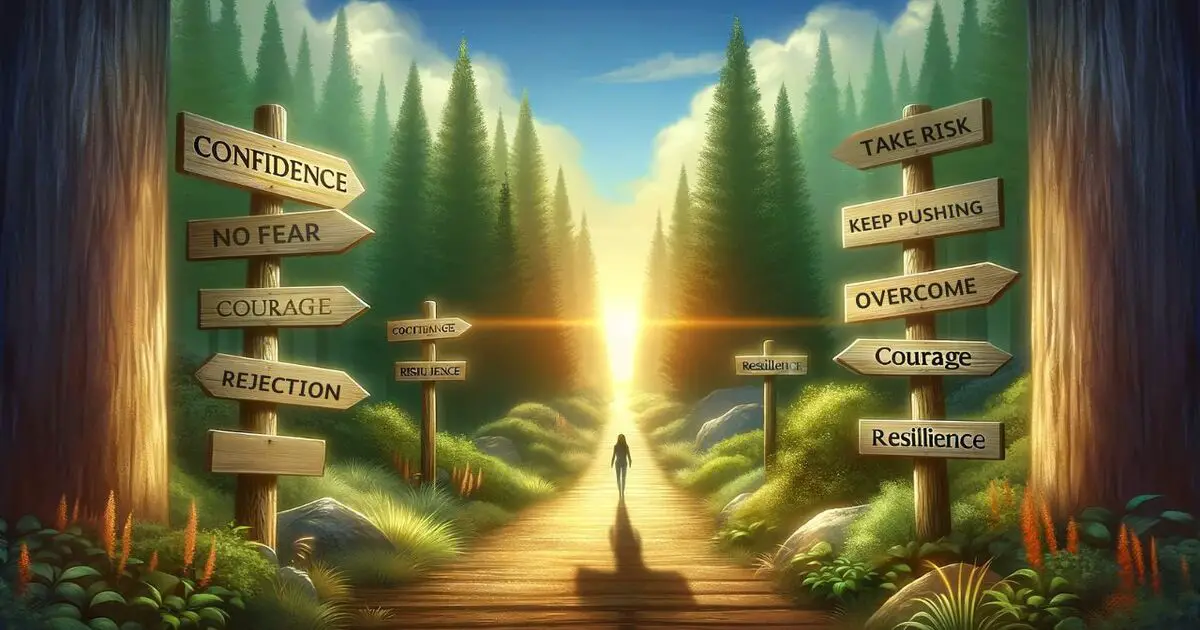8 Traits That Self-Assured People Have!

As someone who has spent years researching and advising clients on cultivating rock-solid self-assurance, I felt compelled to distill my insights into this article.
When you read the phrase “self-assured person”, what image comes to mind? For me, it’s someone who remains steadfast and unflappable even amidst turmoil.
They handle criticism with grace, unphaseable in their beliefs. Stress rolls off their back as they glide from one challenge to the next with ease.
The kind of person who makes confidence look effortless. We all have known certain individuals who seem to radiate that magnetic self-assured energy. You feel more centered just being in their orbit.
So what’s their secret sauce? In this comprehensive guide, I break down the 8 distinguishing traits of truly self-assured people.
From taking ownership of their circumstances to celebrating flaws along with strengths — we will unpack the subtle habits that set them apart.
Consider this your blueprint to step into your most self-assured self! I’ll be sharing frank insights from my journey as well. By the end, you’ll have actionable tips for building unflinching confidence in your abilities and inherent worth — no matter what life throws your way.
When we nurture our self-belief, it ripples outwards to uplift those around us. So let’s dive in and uncover what it takes to become beacons of assurance in a world that sorely needs it!
Key Takeaways: Crafting an Unshakable Sense of Self-Assurance
As we uncover what sets self-assured people apart, inspiring truths emerge:
The path to self-assurance requires courage, compassion, and commitment. But the payoff is immeasurable growth, fulfillment, and purpose.
We each hold the pen to author our stories of confidence and contribution. It’s time to start writing!
What is self-assurance?
As a professional life coach, I often get asked: What is self-assurance and why does it matter?
Self-assurance is an inner sense of confidence, worth, and belief in your abilities. It means having faith that you have what it takes to handle challenges, pursue opportunities, and become the person you wish to be.
When you’re self-assured, you don’t second guess yourself or give too much weight to naysayers and critics. You understand your inherent value as a human being, regardless of worldly measures of success.
You can brush off failures and rejections without feeling crushed. And you feel worthy of love, joy, fulfillment, and prosperity.
In essence, self-assurance is a deep knowing that you’ll be alright — maybe not today, this week, or even this year. But that you are resilient and resourceful enough to get back on your feet after hard knocks. It’s recognizing the seeds of greatness within, even if they haven’t fully germinated yet.
This unshakeable belief fuels motivation, making it easier to show up authentically, take risks, and weather turbulent times. It also magnetizes opportunities and positive people, creating a snowball effect for growth.
When you trust in yourself, you don’t give away your power or wait for the world to validate you. Your internal compass keeps you moving ahead with purpose.
So if you want to live boldly and reach your highest potential, nurture your self-assurance muscle! It will serve you well on the long winding road to self-actualization.
Subscribe to Create Higher Vibrations!
Get Inspiration and Practical advice straight to your inbox.
8 Traits That Reveal You Are A Self-Assured Person
An Optimistic Outlook
I move through life with an attitude of optimism, even when facing daunting odds. I don’t deny the reality of challenges but also don’t catastrophize them. Instead, I break down problems and hone in on actionable solutions. My positive mindset fuels my belief that I have what it takes to overcome obstacles.
When things feel bleak, I consciously shift my perspective. I remind myself that no situation lasts forever – this too shall pass. I also focus on the progress made rather than get bogged down in how far I have left to go. Small daily wins reinforce my optimism and resolve to see things through with a smile.
My buoyant nature attracts opportunities and people. And my ability to lift others makes me feel worthy and significant. Spreading hope and cheer, especially during turmoil, is profoundly rewarding. My optimistic outlook sustains my drive and also makes the journey lighter.
Trust and Assertiveness
I have full faith in my expertise, perspectives, and decisions. This intrinsic trust provides an internal compass that guides my path without second-guessing. I don’t doubt my voice or feel I need external validation. I speak up assertively, expressing my authentic thoughts with clarity and confidence.
My self-assurance allows me to tune out naysayers who may try to undermine me. I don’t feel the need to dominate conversations or force my agenda.
I simply state my standpoint, make logical arguments, and leave it at that. I don’t take opposing views personally or let them erode my self-trust.
This assertive yet flexible approach has served me well professionally and personally. I can articulate my needs and defend boundaries without aggressiveness or appeasement. My ability to communicate empowers me to solve problems and reconcile differences through open dialogue.
Goal-Oriented and Progress-Driven
Achievement-oriented by nature, I stay laser-focused on my goals. I make detailed plans, balancing ambition with pragmatism.
With clear targets in sight, I can visualize succeeding and this fuels my motivation. Even with multiple priorities, I don’t lose sight of my North Star objectives.
My progress-driven mindset keeps me from getting complacent. I regularly track metrics to quantify my improvement across skills, behaviors, and outcomes. These small milestones affirm that I’m headed in the right direction. On days when forward momentum ebbs, I review how far I’ve come rather than how far I have to go.
My innate need for growth feeds my self-assurance. Constructive dissatisfaction leads me to continually raise the bar and expand my capabilities. But it’s balanced with gratitude for each step of progress made along the winding road to self-actualization.
Decisiveness and Understanding Capabilities
When faced with difficult decisions, I think critically and weigh options judiciously. But I don’t agonize or dither endlessly. I gather enough data to make an informed choice that aligns with my goals and values. This decisive approach gives me the clarity and conviction to act.
Just as important as choosing swiftly is knowing when NOT to decide immediately. I discern situations that require further analysis before committing.
My self-awareness and honesty about my abilities allow me to determine when I need more expertise or counsel. This nuanced understanding of my capabilities makes my decisiveness even more impactful.
I don’t view reversals as failures if new information emerges. Being adaptable doesn’t diminish my resolve. It simply means I’m open to changing course quickly and confidently if needed. My ability to pivot strategically while staying principled is a hallmark of self-assurance.
Emotional Stability
Staying even-keeled through ups and downs enables me to handle stressful situations with composure. I don’t repress emotions but rather process them mindfully so they don’t control my responses. This healthy self-regulation helps me confront challenges rationally.
My equanimity comes from high self-regard that is not contingent on external approval or desired results. I know my worth transcends worldly success and failures don’t dilute my intrinsic value. This detached perspective allows me to face criticism, rejection, and obstacles with grace.
By cultivating my inner reservoir of peace and quiet confidence, I can navigate turbulence with a steady hand. My emotional resilience and stability give me an unflappable presence. I move through chaos and uncertainty with savvy, optimism, and balance – the hallmarks of self-assurance.
Confidence: The Foundation
As someone self-assured, confidence is my bedrock. I have an unshakable faith in my abilities and the decisions I make. When tackling challenges, I don’t doubt myself or question if I have what it takes. My self-belief propels me forward to turn my visions into reality.
Failure doesn’t faze me either. I view setbacks as opportunities to recalibrate and come back stronger. Each stumble makes me more resilient and adds to my confidence.
I celebrate the smallest of wins because I know that consistent progress, however incremental, leads to success. My unwavering confidence makes me a formidable force – one that persists in the face of obstacles.
Assurance in Self-Compassion
I uphold kindness as my core values, including being compassionate with myself. When I come up short or make a mistake, I don’t admonish myself. Instead, I look at it as part of my growth trajectory. I course-correct without judgment and focus on the lessons learned.
My self-compassion has taught me not to be a harsh critic of my shortcomings. I celebrate my strengths and achievements wholeheartedly.
But I also acknowledge my weaknesses and limitations with gentleness and understanding. This balance allows me to nurture my best self without minimizing my flaws.
My self-assurance stems from embracing myself holistically – triumphs, failures, and all. With self-compassion as my anchor, I can weather life’s ups and downs with grace.
Taking Responsibility
Accountability is the cornerstone of my self-assurance. When facing outcomes, good or bad, I don’t play the blame game. I take complete ownership, knowing that I’m responsible for all my actions and decisions.
This mindset makes me proactive instead of reactive. If a project goes sideways, I immediately reflect on how my leadership, planning, or execution could be improved. Rather than make excuses or point fingers, I take constructive steps so I don’t repeat mistakes.
Owning my circumstances also prevents me from seeing myself as a victim. I don’t give away my power or wait for external forces to dictate my reality. The locus of control lies firmly within me. This empowering perspective is what makes me feel self-assured as I navigate life’s twists and turns.
Developing Self-Assurance: Practical Strategies for Growth
Gaining self-assurance is a journey of personal development that involves understanding and overcoming self-doubt. By incorporating practical strategies, you can cultivate a more confident and self-assured mindset. Here are some effective approaches:
- Awareness of Limiting Beliefs: Recognize and challenge the limiting beliefs that hold you back. These could be deep-seated notions about your capabilities, worthiness, or what you deserve in life. By identifying these beliefs, often rooted in past experiences or societal norms, you can begin to question and dismantle them.
- Reframe Failures as Learning Opportunities: Adopt a growth mindset where failures are seen not as setbacks but as valuable lessons. Each failure provides insights and learnings that contribute to your growth and resilience. Embrace these experiences as crucial steps in your journey.
- Focus on Your Strengths: Identify and nurture your strengths and talents. Confidence builds when you engage in activities where you feel competent. This doesn’t mean ignoring areas for improvement but rather balancing them with what you already excel at.
- Set Realistic Goals and Celebrate Achievements: Set achievable goals and celebrate your progress, no matter how small. Each accomplishment, even minor ones, reinforces your belief in your abilities and boosts your self-assurance.
- Engage in Positive Self-Talk: Replace negative self-talk with affirmations and positive statements about yourself. How you talk to yourself influences your self-perception and confidence levels.
- Surround Yourself with Supportive People: The company you keep can significantly impact your self-esteem. Surround yourself with people who uplift you and believe in your potential.
- Take Calculated Risks: Stepping out of your comfort zone and taking risks, even small ones can significantly enhance your self-assurance. Each new challenge you overcome builds confidence.
- Practice Self-Compassion: Be kind to yourself during setbacks or when things don’t go as planned. Self-compassion fosters emotional resilience, allowing you to bounce back more effectively.
- Seek Feedback Constructively: Use feedback as a tool for growth rather than a source of discouragement. Constructive criticism, when approached with an open mind, can be invaluable in personal development.
- Engage in Continuous Learning: Embrace learning as a lifelong process. The more you learn, the more competent and confident you become in your abilities.
Remember, the path to self-assurance is unique for everyone. Be patient with yourself and recognize that building confidence is a gradual process.
Common myths about self-assurance
Many myths about self-assurance can prevent people from achieving it. Here are some of the most common myths:
These myths are all false. Self-assurance is not something that you are born with, it is something that you can learn and develop. It is not the same as arrogance, and it is not only for perfect people. You can be self-assured and humble at the same time, and self-assurance is not a sign of weakness.
If you are struggling with self-assurance, it is important to challenge these myths. Remember, self-assurance is a skill that you can learn and develop. With practice, you can become more self-assured and achieve your goals.
How to deal with people who are not self-assured
Dealing with people who are not self-assured can be challenging. They may be constantly seeking approval, be afraid to take risks or have difficulty making decisions. Here are some tips for dealing with people who are not self-assured:
By following these tips, you can help people who are not self-assured to build their confidence and become more successful.
Final Takeaway
After dissecting the habits that set a self-assured person apart, an empowering truth emerges – confidence is a skill accessible to us all, not a fixed trait.
We each hold the pen to write our stories of self-belief and resilience. As much as external circumstances shape us, the narratives we tell ourselves are even more powerful. Our inner voice can either paralyze us with doubt or propel us to new heights of potential.
So take heart that no one starts out oozing self-assurance from birth. Even the most successful and magnetic individuals have faced crippling insecurities at times.
But ultimately they chose faith in themselves over fear. Slowly but surely they chipped away at negative self-talk and cultivated habits to reinforce their self-worth.
The great news is that we can actively rewire our beliefs through simple but consistent actions. Something as basic as improving our posture gives an immediate confidence boost. Jotting down our skills and strengths awakens us to untapped talents. Celebrating little daily wins trains our brains to spot the positive before the negative.
While the journey to self-assurance requires commitment and courage, the rewards make it profoundly worthwhile. There is no better catalyst for leading a spirited, fulfilling, and purpose-driven life.
So why wait for external validation to determine your self-worth? You hold the pen – start authoring your story of self-belief today. The world needs more people shining bright with hard-won confidence despite the darkness. Be the beacon of assurance and possibility you wish to see!



